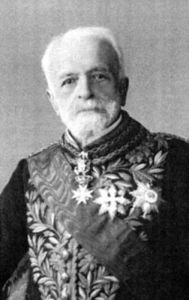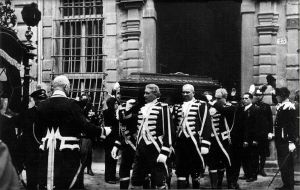Diplomatic and Senator
 Giovanni Battista Borea d'Olmo was born in Genoa on 11th October 1831 to Michele and Anna Carrega, called "Duke Bacicìn" by the people of Sanremo.
Giovanni Battista Borea d'Olmo was born in Genoa on 11th October 1831 to Michele and Anna Carrega, called "Duke Bacicìn" by the people of Sanremo.
F. La Cola remembers him as follows: "He was the heir of two ancient families of high Ligurian nobility. From childhood he was initiated into court life, soon becoming the Page of honour of King Charles Albert. From that moment on he remained closely linked to the Savoy dynasty, throughout the period of its apogee constituted by the Risorgimento and the construction of National Unity.
After graduating in Law in Genoa in 1849 (when he was only 18 years old), he settled in Turin; he swore in the hands of the Count of Cavour, whose special secretary he was, and then developed a career at court as Master of Ceremonies under the reign of Victor Emmanuel II. He continued to serve his Kings and later became Prefect of the Palace, the top of the courtly hierarchy.
I presume he had lived more in Turin and Rome than in Sanremo, yet in recent years from the drawing room of his palace in Via Vittorio (today Via G. Matteotti) he continued to participate with his heart in the life of his city.
The Nobiluomo died in Sanremo sixty years ago, on 19th October 1936.
 He was one hundred and five years old and eight days old. A photograph published in the Echo of the Riviera twenty years ago documents the exit of the coffin from the great portal of Palazzo Borea, carried on his shoulders by six valets in livery and greeted with the honour of arms by a troop of Carabinieri in high uniform. The chronicler Gino Guglielmi testifies that the news of his death in Sanremo ran from the "Marina" to the "Pigna", accompanied by a unanimous regret: "U sciù Bacicia u l'è mortu!
He was one hundred and five years old and eight days old. A photograph published in the Echo of the Riviera twenty years ago documents the exit of the coffin from the great portal of Palazzo Borea, carried on his shoulders by six valets in livery and greeted with the honour of arms by a troop of Carabinieri in high uniform. The chronicler Gino Guglielmi testifies that the news of his death in Sanremo ran from the "Marina" to the "Pigna", accompanied by a unanimous regret: "U sciù Bacicia u l'è mortu!
It must be said that Duke Bacicìn had been quite close to his fellow citizens through many significant gestures of Christian charity and authentic nobility of spirit, the same prerogatives that sublimate, in the eyes of the simple, the nobility of birth into spiritual nobility.
The greatest tribute from his city the good Duke Bacicìn had received on the occasion of his hundredth anniversary, celebrated in 1931. The Municipal Administration offered the city's preclaro a roll of honour containing the autograph signatures of all the heads of Sanremo's families « in accordance with the profound sentiment of the people of Sanremo who wish to honour their countryman H.E. Duke Giovan Battista Borea d'Olmo, Prefect of the Palace, Grand Master of Ceremonies, Senator of the Kingdom, for the hundredth year of his life and for many of his merits as a citizen and patriot ».
In the same register... the poet Francesco Pastonchi motivates the tribute as follows: « ... not only as a sign of honour for so much victory over time, but even more as a consent of affectionate exultation that all his people of Sanremo want so tangibly to send him to their ancestral home, from which one day the yearning for the city's freedom was hovered and the Christian cult of every human kindness was always preserved between the Madonna della Costa and the Marina ».
(Author : F. La Cola)




